人教版(2019) 必修 第三册 Unit 2 Morals and Virtues 单元整体提升课件(共51张PPT)
文档属性
| 名称 | 人教版(2019) 必修 第三册 Unit 2 Morals and Virtues 单元整体提升课件(共51张PPT) | 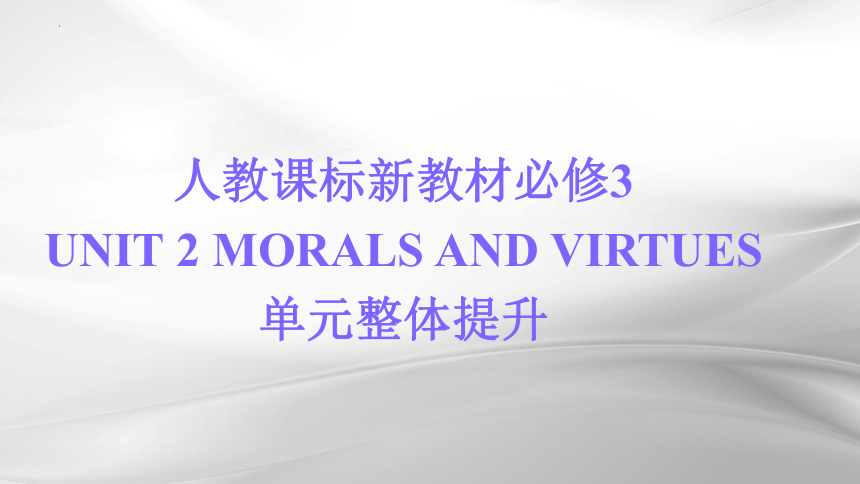 | |
| 格式 | pptx | ||
| 文件大小 | 933.0KB | ||
| 资源类型 | 教案 | ||
| 版本资源 | 人教版(2019) | ||
| 科目 | 英语 | ||
| 更新时间 | 2023-07-22 10:49:59 | ||
图片预览

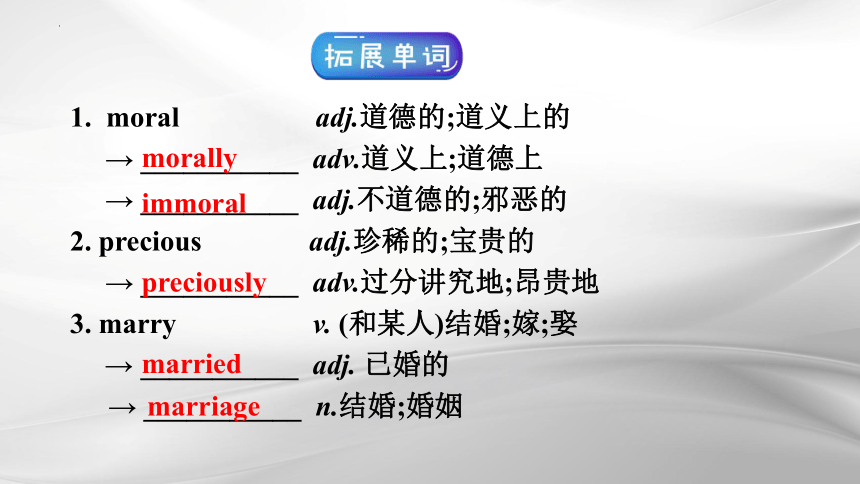
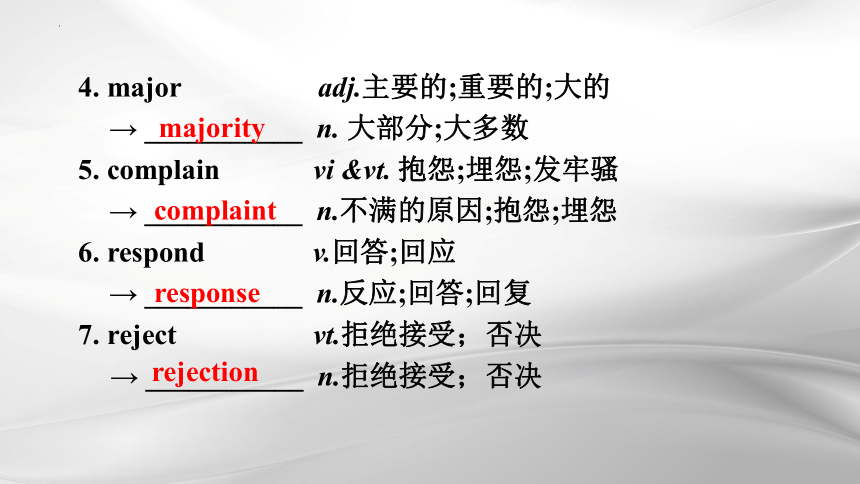
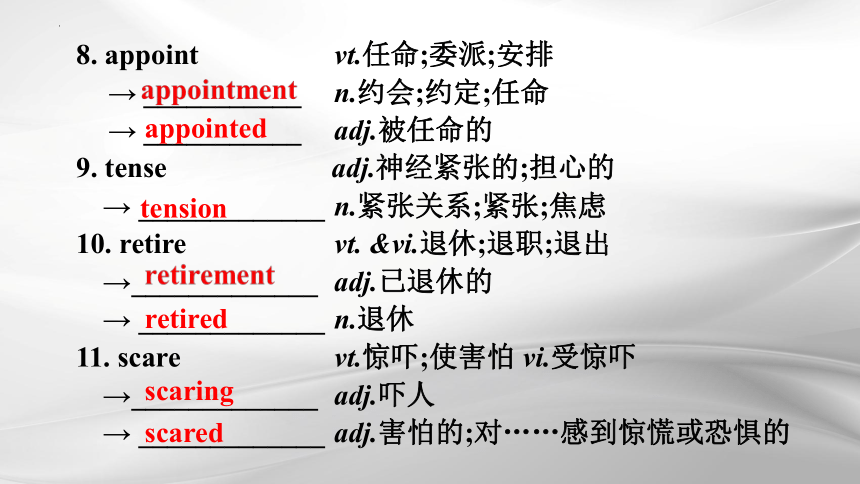
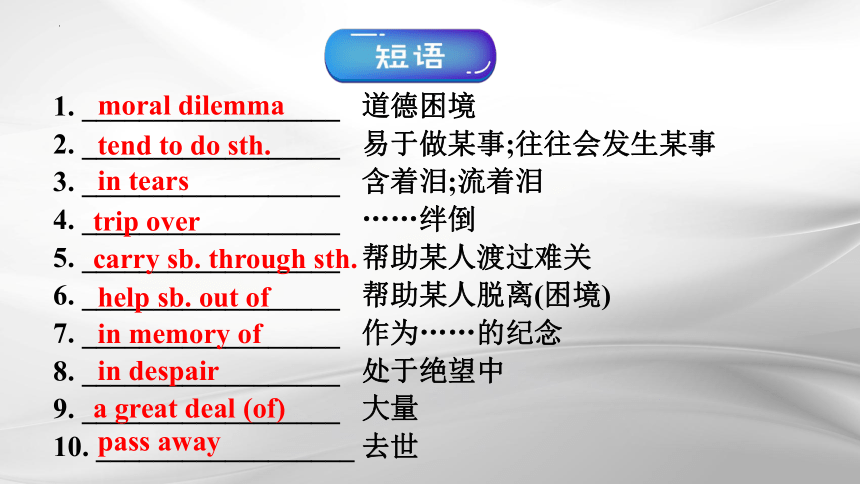
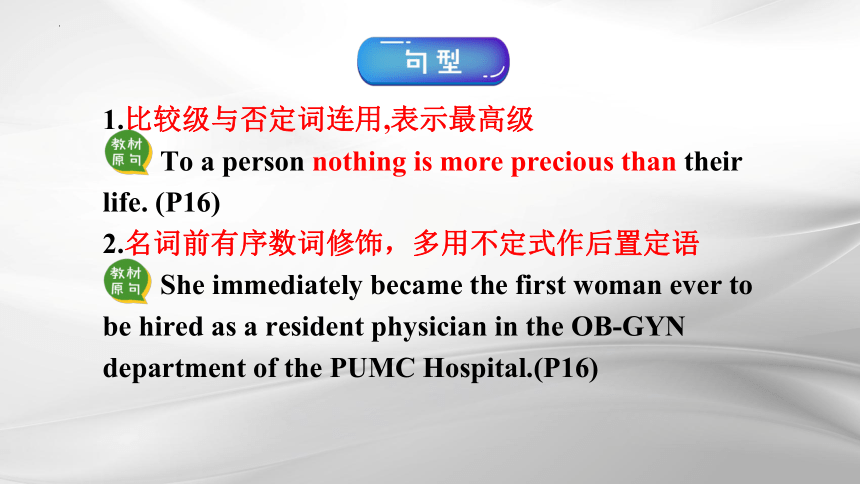
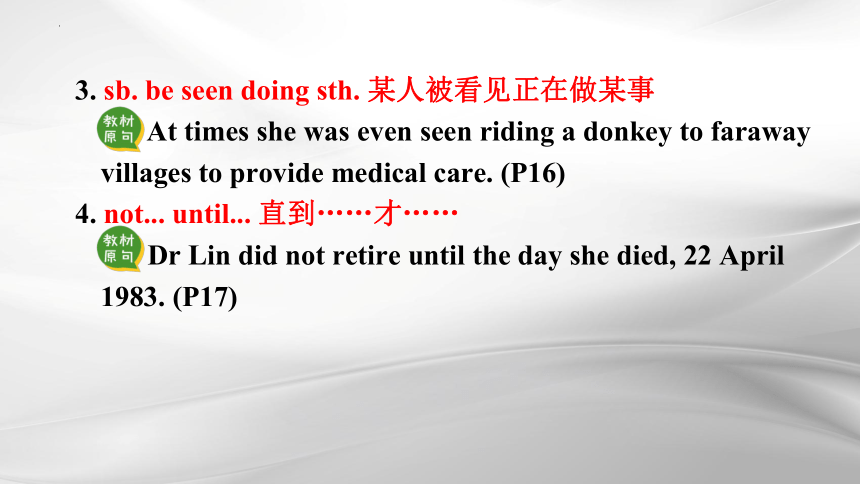
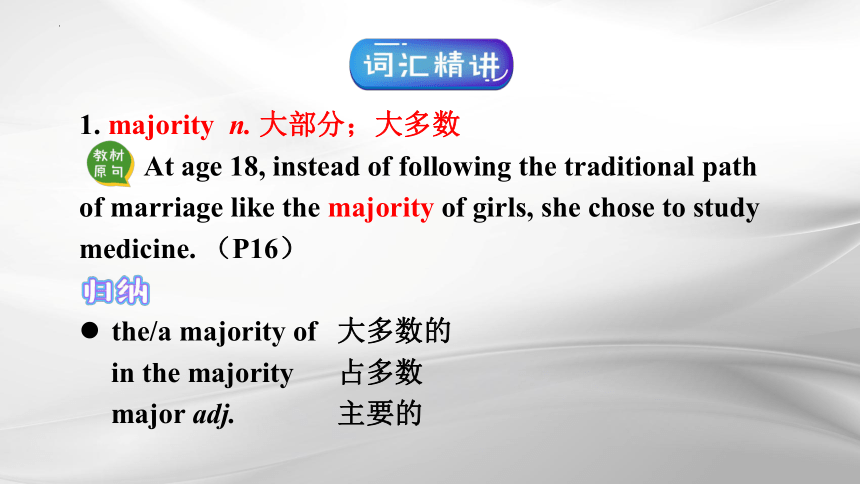
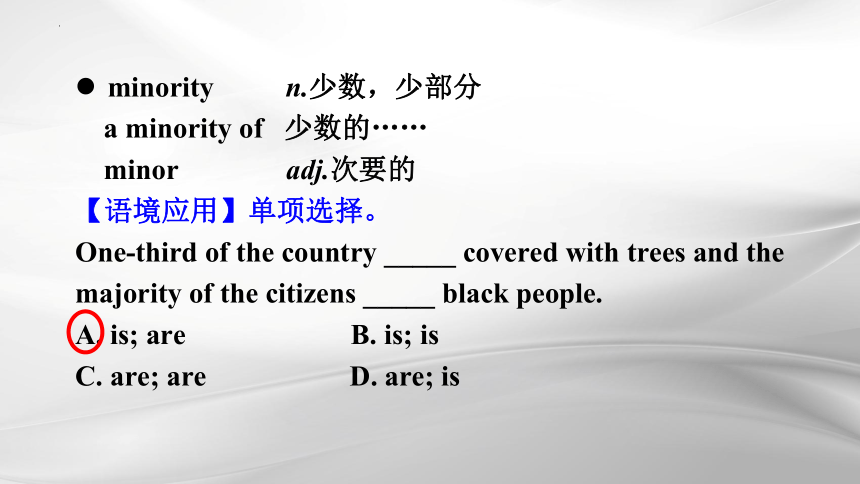
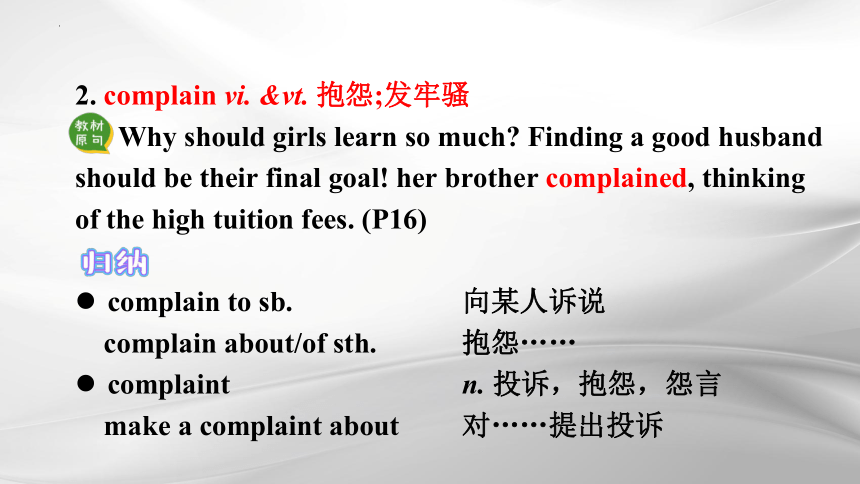
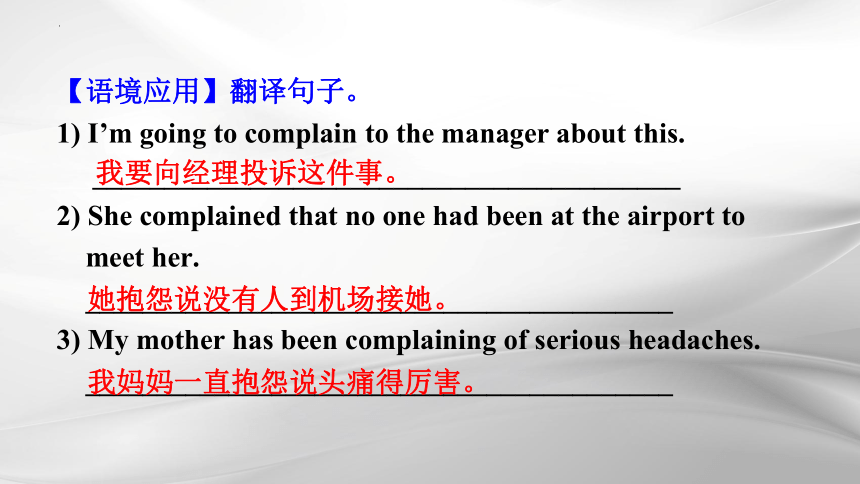
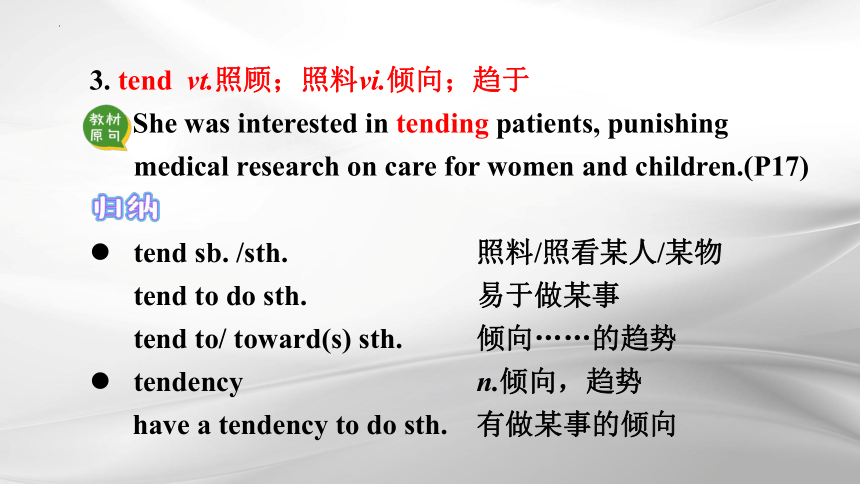
文档简介
(共51张PPT)
人教课标新教材必修3
UNIT 2 MORALS AND VIRTUES
单元整体提升
moral adj.道德的;道义上的
→ ___________ adv.道义上;道德上
→ ___________ adj.不道德的;邪恶的
2. precious adj.珍稀的;宝贵的
→ ___________ adv.过分讲究地;昂贵地
3. marry v. (和某人)结婚;嫁;娶
→ ___________ adj. 已婚的
→ ___________ n.结婚;婚姻
morally
immoral
preciously
married
marriage
4. major adj.主要的;重要的;大的
→ ___________ n. 大部分;大多数
5. complain vi &vt. 抱怨;埋怨;发牢骚
→ ___________ n.不满的原因;抱怨;埋怨
6. respond v.回答;回应
→ ___________ n.反应;回答;回复
7. reject vt.拒绝接受;否决
→ ___________ n.拒绝接受;否决
majority
complaint
response
rejection
8. appoint vt.任命;委派;安排
→ ___________ n.约会;约定;任命
→ ___________ adj.被任命的
9. tense adj.神经紧张的;担心的
→ _____________ n.紧张关系;紧张;焦虑
10. retire vt. &vi.退休;退职;退出
→_____________ adj.已退休的
→ _____________ n.退休
11. scare vt.惊吓;使害怕 vi.受惊吓
→_____________ adj.吓人
→ _____________ adj.害怕的;对……感到惊慌或恐惧的
tension
retired
scaring
scared
appointed
1. __________________ 道德困境
2. __________________ 易于做某事;往往会发生某事
3. __________________ 含着泪;流着泪
4. __________________ ……绊倒
5. __________________ 帮助某人渡过难关
6. __________________ 帮助某人脱离(困境)
7. __________________ 作为……的纪念
8. __________________ 处于绝望中
9. __________________ 大量
10. __________________ 去世
moral dilemma
tend to do sth.
in tears
trip over
carry sb. through sth.
help sb. out of
in memory of
in despair
a great deal (of)
pass away
1.比较级与否定词连用,表示最高级
To a person nothing is more precious than their life. (P16)
2.名词前有序数词修饰,多用不定式作后置定语
She immediately became the first woman ever to be hired as a resident physician in the OB-GYN department of the PUMC Hospital.(P16)
3. sb. be seen doing sth. 某人被看见正在做某事
At times she was even seen riding a donkey to faraway villages to provide medical care. (P16)
4. not... until... 直到……才……
Dr Lin did not retire until the day she died, 22 April 1983. (P17)
1. majority n. 大部分;大多数
At age 18, instead of following the traditional path of marriage like the majority of girls, she chose to study medicine. (P16)
the/a majority of 大多数的
in the majority 占多数
major adj. 主要的
minority n.少数,少部分
a minority of 少数的……
minor adj.次要的
【语境应用】单项选择。
One-third of the country _____ covered with trees and the majority of the citizens _____ black people.
A. is; are B. is; is
C. are; are D. are; is
2. complain vi. &vt. 抱怨;发牢骚
Why should girls learn so much Finding a good husband should be their final goal! her brother complained, thinking of the high tuition fees. (P16)
complain to sb. 向某人诉说
complain about/of sth. 抱怨……
complaint n. 投诉,抱怨,怨言
make a complaint about 对……提出投诉
【语境应用】翻译句子。
1) I’m going to complain to the manager about this.
_________________________________________
2) She complained that no one had been at the airport to
meet her.
_________________________________________
3) My mother has been complaining of serious headaches.
_________________________________________
我要向经理投诉这件事。
她抱怨说没有人到机场接她。
我妈妈一直抱怨说头痛得厉害。
3. tend vt.照顾;照料vi.倾向;趋于
She was interested in tending patients, punishing medical research on care for women and children.(P17)
tend sb. /sth. 照料/照看某人/某物
tend to do sth. 易于做某事
tend to/ toward(s) sth. 倾向……的趋势
tendency n.倾向,趋势
have a tendency to do sth. 有做某事的倾向
【语境应用】根据所给汉语补全下列句子。
1)人们普遍倾向于做他们擅长或喜欢的事情。
Generally, people _________ do what they are good at
doing or what they like doing.
2) 西蒙的很多朋友认为他的观点趋于偏激。
Many of Simon’s friends think his view ______________
the extreme.
3) 当人们不同意大卫的观点时,他就容易生气。
David _________ get angry when people disagree with
him.
tend to
tends towards/to
tends to
4. replace vt.接替;取代;更换
The student union will hold a special meeting in January to elect someone to replace the secretary.(P17)
replace sth. with/by sth. 用某物代替某物
take the place of=take one’s place 取代
in place of 代替;取代
【语境应用】完成句子。
1)They replaced their beloved old cars _____________ expensive new sports cars.
2)With the development of science and technology, human beings _____________ by robots in the future.
3)I wish that sports day could be abandoned and _____________ with some other less competitive event.
with
will be replaced
replaced
5. harm n.&v. 伤害;损害
Is there no one in this village who feels any responsibility to keep their neighbours from harm
do/ cause harm to 对造成伤害
There is no harm in doing ……做某事无害处
harmful adj. 有害的,造成伤害的
be harmful to 对……有害
【语境应用】根据汉语意思补全下面句子。
1) 他永远不会伤害任何人。
He would never ________________________.
2) 这起诉讼案件将损害我的生意。
The court case will ________________________ my
business.
3) 打扮一下不会对你有任何坏处。
It wouldn’t ________________________to dress yourself
up.
do harm to / be harmful to
do you any harm
harm anyone / anybody
carry sb. through sth. 帮助某人度过难关
These words of Dr Lin Qiaozhi give us a look into the heart of these amazing woman, and what carried her through a life of hard choices. (P16)
carry through 完成;进行到底
carry out 执行,实行;贯彻;实现
carry on 开展;维持;继续
carry forward 继承,弘扬
carry away 拿走;带走;使激动;使着迷
carry off 抢走;窃走;赢得;摘得奖牌;完成
【语境应用】用适当的介词或副词填空。
1) Sorry, I interrupted you. Please carry ________.
2) Turn off the water supply before carrying ________ repairs.
3) In the end, it was her belief in justice that carried her ________.
4) The activity is aimed at carrying ________ the Chinese traditional culture.
on
out
through
forward
2. pass away 去世
Sadly, Dr Bethune passed away in November the following year and were buried in Shijiazhuang.(P18)
pass sth. on to sb. 将某物交给某人
pass sth. down 将某物一代代流传下来
pass by 路过; (时间)过去
pass out 分发;分配;晕倒
pass down 传下来
【语境应用】用以上pass短语的适当形式填空。
1) The tradition has ________________ from father to son for generations.
2) _______ the book _______ to me when you’ve finished with it.
3) It really made us shocked that Mrs Green ________________ in her sleep last night.
4) What made me angry was that he ________________ without greeting me.
been passed down
Pass
on
passed away
passed by
3. a great deal (of)大量
After a great deal of efforts, she finally succeeded in
moving it to the side of the street.(P20)
常用来修饰不可数名词的单词或词组
much; a (great) deal of; a bit of; a(n)(large) amount
of/ amounts of
【语境应用】翻译下列句子。
1)这个项目节省了大量的资金。
2)我们村比他们村富裕多了。
A great deal of money has been saved for the project.
Our village is a great deal richer than their village.
4. in memory of 作为对……的纪念
After Dr Bethune’s death, Chairman Mao wrote an article in memory of him, in which he praised Dr Bethune as a hero to be remembered in China.(P18)
in praised of 赞美;歌颂
in honour of 纪念;向……表达敬意
in search of 寻找
in charge of 负责;掌管
【语境应用】根据所给的汉语提示完成下列句子。
1)为了纪念这位著名的作家,他们兴建了这所学校。
They founded the school ___________________________.
2) 为了寻求更好的生活,他已经下定决心去上海。
He has made up his mind to go to Shanghai
___________________________.
in search of a better life
in memory of the famous writer
1. 先行词为抽象地点的定语从句
A moral dilemma is a situation in which you have two or more difficult choices to make.(P14)
当先行词是stage,point,case,situation,position,job,business,scene等表示抽象地点的名词,并且定语从句缺少状语时,常用关系副词where来引导定语从句,相当于in which。
抽象名词后面的定语从句若缺少主语或宾语则用that/which来引导。
【语境应用】单句语法填空。
1) Their children at the stage ___________ she can say individual words but not full sentences. (2019天津高考)
2) With the development of tourism, security is becoming a
key point ___________ tourists are concerned about.
3) Our class is a warm family, ___________ we care for and encourage each other.
4)When we get to the point ___________ I was staying up really late at night to get my work down.
where
that/ which
where
where
2. the+序数词+名词+to do sth.
In 1941, Dr Lin became the first Chinese woman ever to be appointed director of the OB-GYN department of the PUMC Hospital…(P16)
当中心词是序数词或被序数词、形容词最高级等修饰或前有the next,the only ,the last等时,常用不定式作后置定语。
动词不定式作定语用来修饰的词多为抽象名词,常见的有:ability,chance,ambition,offer,anxiety,answer,reply,attempt,belief
【语境应用】单句语法填空。
He is always the first ____________(answer) questions.
As far as I know, Amy the first person ____________(witness)
the car accident.
3) The ability ____________(express) an idea is as important as
the idea itself.
to answer
to witness
to express
3. 比较级与否定词连用表最高级
To a person, nothing is more important than their life. (P16)
【语境应用】完成句子。
1)在我看来,健康是最重要的。
In my opinion, ___________________________ health in life.
2)没有什么比那更难了。
___________________________ than that.
3) Nothing is ______ (easy) than to cheat oneself.
再没有什么比欺骗自己更容易的了。
nothing is more important than
Nothing is more difficult
easier
4. sb. be seen doing sth. 某人被看见正在做某事
At times she was even seen riding a donkey to faraway villages to provide medical care. (P16)
与see类似的表示感觉和心理状态的动词,如hear、feel、smell、 watch、find等,其后都可接“宾语+动词-ing形式”构成的复合宾语结构,动词-ing形式充当宾语补足语,用来补充说明宾语的动作和情况。
eg. We often see her dancing in front of the public.
【语境运用】用所给词的适当形式完成句子。
1) We saw the teacher _______ (make) the experiment.
2) I heard an English song __________ (sing) by a little girl when I passed by her room yesterday.
making
being sung
动词-ing形式是非谓语动词的一种,兼有动词和形容词的特征,在句中可作表语,定语,宾语补足语和状语,一般表示进行或主动的意思。
动词-ing形式用作状语时,其逻辑主语必须与句子的主语一致,动词-ing形式所表示的动作和句子的主语是主动关系。
动词-ing形式在句中可以作时间、原因、条件、让步、方式、伴随、程度和结果状语。
动词-ing形式作状语
1. 作时间状语
eg. Seeing the police, he made a run for the exit.
一看到警察,他就朝出口奔去。
2. 作原因状语
eg. Being ill, he didn’t go to school yesterday.
因为生病了,他昨天没有上学。
3. 作条件状语
eg. Turning to the left, you will see a school.
向左转你就会看到一所学校。
4. 作让步状语
eg. Granting this to be true, we cannot explain it.
虽然我们承认这是事实,却无法予以说明。
5. 作方式状语
eg. You gave me such a fright creeping up on me like that!
你那样不声不响地从后面过来,吓我一跳!
6. 作结果状语
eg. The child fell, striking his head against the door and cutting it.
那孩子跌倒了,头碰在门上磕破了。
7. 作伴随状语
eg. The little boy went upstairs, trailing his teddy bear behind him.
那个小男孩走上楼去,身后拖着他的玩具熊。
Emma was sitting in an armchair reading a book.
Emma坐在一张扶手椅上看书。
Attention:
动词-ing形式(短语)作状语时,要注意它的时间性,即注意是用一般式(doing)还是用完成式(have done)。
当动词-ing形式的动作与谓语动词的动作同时发生或几乎同时发生时,用一般式;当它的动作先于谓语动词所表示的动作发生时,用完成式。
eg Walking in the street, I met an old friend of mine.
走在大街上时,我遇到了一位老朋友。
Having finished the letter, he went to post it.
他写完信后就把它寄了出去。
动词-ing形式的时态
使用动词-ing形式的主动式(doing/having done)还是被动式(being done/having been done),这主要取决于现在分词和句子主语之间的关系。通常,句子的主语就是动词-ing形式的逻辑主语。
eg. We walked along the river bank, talking and laughing.
我们沿河岸有说有笑地走着。(主动)
Being repaired now, the computer can’t be used.
由于现在正在修理,这台电脑不能用了。(被动)
动词-ing形式的语态
宾语补足语位于宾语之后,补充说明宾语是什么或怎么样,与宾语有逻辑上的主谓关系。
We can see a boy singing in the picture.
宾语补足语
主语
谓语
宾语
动词-ing形式作宾语补足语
eg. We can see her listening to music.
The police caught the man stealing the money.
Attention:
动词-ing形式作宾语补足语时,常和表示感观和心理状态的动词see, notice, watch, look at, observe, hear, listen to, smell, feel, find, catch等动词后与一个名词(代词)构成复合宾语。
在see,hear,feel,watch等感官动词后,既可用动词-ing形式作宾语补足语,也可用不带to的动词不定式作宾语补足语。用动词-ing形式时,表示动作正在进行;用不带to的动词不定式时,表示动作经常发生或动作从开始到结束的全过程。
eg I saw him getting out of the car. 我看见他正在下车。
I saw him get out of the car. 我看见他下车了。
eg. I’m sorry to have kept you waiting for so long.
不好意思让你等这么久。
His father do not let him smoke.
他父亲不让他抽烟。
动词-ing形式作宾语补足语时,也常和表示使役的动词keep,get,leave,set,have等动词后与一个名词(代词)构成复合宾语,表示,“使……一直处于某种状态”。
选择括号内合适的内容填空。
1. Clean the desk, Peter! Don't just stand there ________(doing, to do) nothing!
2. Joe hurt his knee ________ (playing, to play) football, so he isn't able to take part in the sports meet tomorrow.
3. Not ________ (knowing, to know) what to do, I called my friend to ask her for advice.
4. While ________ (walking, to walk) to school, they saw many beautiful flowers.
doing
playing
knowing
walking
5. _____________ (Having spent, Spent) most of his life in London, Sam has now gone to live in a small village.
6. The boy ________ (injuring, injured) in the accident was taken to the hospital immediately.
7. The man ________ (sitting, to sit) next to me on the plane was asleep most of the time.
8. The waiting room was empty except for an old man ________ (sitting, to sit) in the corner ________ (reading, to read) a magazine.
Having spent
injured
sitting
sitting
reading
There has been a dramatic rise in the number of extreme weather events over the past 20 years, caused largely by rising global temperatures, according to a new report from the United Nations. From 2000 to 2019, there were 7,348 major natural disasters around the world, ____________ (result) in USD 2,970 billion in economic loss. Much of this increase can be due to climate change.
(2021北京卷)
resulting
2. I was upset to learn that many sea animals eat plastic garbage, __________ (think) it is food. (2021新高考卷II)
3. Later, they learned to work with the seasons, planting at the right time and in dry areas, ___________ (make) use of annual floods to irrigate (灌溉) their fields. (2020浙江卷)
4. Nervously _________(face) challenges, I know I will whisper to myself the two simple words “Be yourself”.
(2019 北京卷)
5. When we got a call _________(say) she was short-listed, we thought it was a joke. (2019 新课标Ⅱ)
thinking
making
facing
saying
Two most precious diamonds
An old man was walking around a market, where he saw a fine camel. He wanted to buy it, so he went to the owner of the camel and bought it home.
On reaching home, the old man asked his son to remove the saddle (鞍). While doing it, the son found a small bag hidden under the saddle, in which there were many precious diamonds (钻石). The son asked his father to keep the
如何写故事评论
【写作任务】
阅读下面一则故事,写一篇读后感。
diamonds for himself, but the old man said to him, “I just paid
for the camel, not for the diamonds. I must return them immediately.”
The old man went back to the market and found the young man from whom he bought the camel. When he returned the bag, the young man was overjoyed and said, “Oh, I forgot that I had hidden my diamonds under that camel’s saddle. Thank you so much for returning it. You can choose one diamond from the bag as a reward.” The old man smiled and said, “I had already kept two most precious diamonds!” Hearing this,
the young man emptied the bag to count his diamonds. “Not a single diamond is lost, so what are the two most precious diamonds you kept ” the surprised young man asked. The old man replied, “They are honesty and integrity (正直).”
注意:词数100左右。
The main purpose of a review is to give your opinion about a piece of writing. You should first give a short description of the writing, and then clearly state your opinion and your reasons.
【写作指导】
一、审题定调
本写作任务要求写一篇读后感。读后感是读了一本书、一篇文章、一首诗、一段话或者几句名言后,把具体感受和得到的启示用书面形式写成的文章。我们在写作时既要有“读”的内容,又要有“感”的内容。“读”要求抓住重点,“感”要求写出体会。
二、谋篇布局
本写作可分为三部分:
第一部分:点明所读故事的标题或主旨;
第二部分:概述故事情节;
第三部分:阐述该故事对你的启示
【范文展示】
Recently, I have read a story named “Two most precious diamonds”, which had a very powerful impression on me.
The story is about an old man who bought a camel. After bringing the camel home, he found some precious diamonds in a bag hidden under the saddle. Then he returned them to the owner, and the owner was so grateful for his honesty that he asked the old man to choose one diamond for himself. To his surprise, the old man rejected his offer.
After reading the story, I was deeply touched by what the old man did. Each of us has two precious diamonds — honesty and integrity, which we must never lose.
人教课标新教材必修3
UNIT 2 MORALS AND VIRTUES
单元整体提升
moral adj.道德的;道义上的
→ ___________ adv.道义上;道德上
→ ___________ adj.不道德的;邪恶的
2. precious adj.珍稀的;宝贵的
→ ___________ adv.过分讲究地;昂贵地
3. marry v. (和某人)结婚;嫁;娶
→ ___________ adj. 已婚的
→ ___________ n.结婚;婚姻
morally
immoral
preciously
married
marriage
4. major adj.主要的;重要的;大的
→ ___________ n. 大部分;大多数
5. complain vi &vt. 抱怨;埋怨;发牢骚
→ ___________ n.不满的原因;抱怨;埋怨
6. respond v.回答;回应
→ ___________ n.反应;回答;回复
7. reject vt.拒绝接受;否决
→ ___________ n.拒绝接受;否决
majority
complaint
response
rejection
8. appoint vt.任命;委派;安排
→ ___________ n.约会;约定;任命
→ ___________ adj.被任命的
9. tense adj.神经紧张的;担心的
→ _____________ n.紧张关系;紧张;焦虑
10. retire vt. &vi.退休;退职;退出
→_____________ adj.已退休的
→ _____________ n.退休
11. scare vt.惊吓;使害怕 vi.受惊吓
→_____________ adj.吓人
→ _____________ adj.害怕的;对……感到惊慌或恐惧的
tension
retired
scaring
scared
appointed
1. __________________ 道德困境
2. __________________ 易于做某事;往往会发生某事
3. __________________ 含着泪;流着泪
4. __________________ ……绊倒
5. __________________ 帮助某人渡过难关
6. __________________ 帮助某人脱离(困境)
7. __________________ 作为……的纪念
8. __________________ 处于绝望中
9. __________________ 大量
10. __________________ 去世
moral dilemma
tend to do sth.
in tears
trip over
carry sb. through sth.
help sb. out of
in memory of
in despair
a great deal (of)
pass away
1.比较级与否定词连用,表示最高级
To a person nothing is more precious than their life. (P16)
2.名词前有序数词修饰,多用不定式作后置定语
She immediately became the first woman ever to be hired as a resident physician in the OB-GYN department of the PUMC Hospital.(P16)
3. sb. be seen doing sth. 某人被看见正在做某事
At times she was even seen riding a donkey to faraway villages to provide medical care. (P16)
4. not... until... 直到……才……
Dr Lin did not retire until the day she died, 22 April 1983. (P17)
1. majority n. 大部分;大多数
At age 18, instead of following the traditional path of marriage like the majority of girls, she chose to study medicine. (P16)
the/a majority of 大多数的
in the majority 占多数
major adj. 主要的
minority n.少数,少部分
a minority of 少数的……
minor adj.次要的
【语境应用】单项选择。
One-third of the country _____ covered with trees and the majority of the citizens _____ black people.
A. is; are B. is; is
C. are; are D. are; is
2. complain vi. &vt. 抱怨;发牢骚
Why should girls learn so much Finding a good husband should be their final goal! her brother complained, thinking of the high tuition fees. (P16)
complain to sb. 向某人诉说
complain about/of sth. 抱怨……
complaint n. 投诉,抱怨,怨言
make a complaint about 对……提出投诉
【语境应用】翻译句子。
1) I’m going to complain to the manager about this.
_________________________________________
2) She complained that no one had been at the airport to
meet her.
_________________________________________
3) My mother has been complaining of serious headaches.
_________________________________________
我要向经理投诉这件事。
她抱怨说没有人到机场接她。
我妈妈一直抱怨说头痛得厉害。
3. tend vt.照顾;照料vi.倾向;趋于
She was interested in tending patients, punishing medical research on care for women and children.(P17)
tend sb. /sth. 照料/照看某人/某物
tend to do sth. 易于做某事
tend to/ toward(s) sth. 倾向……的趋势
tendency n.倾向,趋势
have a tendency to do sth. 有做某事的倾向
【语境应用】根据所给汉语补全下列句子。
1)人们普遍倾向于做他们擅长或喜欢的事情。
Generally, people _________ do what they are good at
doing or what they like doing.
2) 西蒙的很多朋友认为他的观点趋于偏激。
Many of Simon’s friends think his view ______________
the extreme.
3) 当人们不同意大卫的观点时,他就容易生气。
David _________ get angry when people disagree with
him.
tend to
tends towards/to
tends to
4. replace vt.接替;取代;更换
The student union will hold a special meeting in January to elect someone to replace the secretary.(P17)
replace sth. with/by sth. 用某物代替某物
take the place of=take one’s place 取代
in place of 代替;取代
【语境应用】完成句子。
1)They replaced their beloved old cars _____________ expensive new sports cars.
2)With the development of science and technology, human beings _____________ by robots in the future.
3)I wish that sports day could be abandoned and _____________ with some other less competitive event.
with
will be replaced
replaced
5. harm n.&v. 伤害;损害
Is there no one in this village who feels any responsibility to keep their neighbours from harm
do/ cause harm to 对造成伤害
There is no harm in doing ……做某事无害处
harmful adj. 有害的,造成伤害的
be harmful to 对……有害
【语境应用】根据汉语意思补全下面句子。
1) 他永远不会伤害任何人。
He would never ________________________.
2) 这起诉讼案件将损害我的生意。
The court case will ________________________ my
business.
3) 打扮一下不会对你有任何坏处。
It wouldn’t ________________________to dress yourself
up.
do harm to / be harmful to
do you any harm
harm anyone / anybody
carry sb. through sth. 帮助某人度过难关
These words of Dr Lin Qiaozhi give us a look into the heart of these amazing woman, and what carried her through a life of hard choices. (P16)
carry through 完成;进行到底
carry out 执行,实行;贯彻;实现
carry on 开展;维持;继续
carry forward 继承,弘扬
carry away 拿走;带走;使激动;使着迷
carry off 抢走;窃走;赢得;摘得奖牌;完成
【语境应用】用适当的介词或副词填空。
1) Sorry, I interrupted you. Please carry ________.
2) Turn off the water supply before carrying ________ repairs.
3) In the end, it was her belief in justice that carried her ________.
4) The activity is aimed at carrying ________ the Chinese traditional culture.
on
out
through
forward
2. pass away 去世
Sadly, Dr Bethune passed away in November the following year and were buried in Shijiazhuang.(P18)
pass sth. on to sb. 将某物交给某人
pass sth. down 将某物一代代流传下来
pass by 路过; (时间)过去
pass out 分发;分配;晕倒
pass down 传下来
【语境应用】用以上pass短语的适当形式填空。
1) The tradition has ________________ from father to son for generations.
2) _______ the book _______ to me when you’ve finished with it.
3) It really made us shocked that Mrs Green ________________ in her sleep last night.
4) What made me angry was that he ________________ without greeting me.
been passed down
Pass
on
passed away
passed by
3. a great deal (of)大量
After a great deal of efforts, she finally succeeded in
moving it to the side of the street.(P20)
常用来修饰不可数名词的单词或词组
much; a (great) deal of; a bit of; a(n)(large) amount
of/ amounts of
【语境应用】翻译下列句子。
1)这个项目节省了大量的资金。
2)我们村比他们村富裕多了。
A great deal of money has been saved for the project.
Our village is a great deal richer than their village.
4. in memory of 作为对……的纪念
After Dr Bethune’s death, Chairman Mao wrote an article in memory of him, in which he praised Dr Bethune as a hero to be remembered in China.(P18)
in praised of 赞美;歌颂
in honour of 纪念;向……表达敬意
in search of 寻找
in charge of 负责;掌管
【语境应用】根据所给的汉语提示完成下列句子。
1)为了纪念这位著名的作家,他们兴建了这所学校。
They founded the school ___________________________.
2) 为了寻求更好的生活,他已经下定决心去上海。
He has made up his mind to go to Shanghai
___________________________.
in search of a better life
in memory of the famous writer
1. 先行词为抽象地点的定语从句
A moral dilemma is a situation in which you have two or more difficult choices to make.(P14)
当先行词是stage,point,case,situation,position,job,business,scene等表示抽象地点的名词,并且定语从句缺少状语时,常用关系副词where来引导定语从句,相当于in which。
抽象名词后面的定语从句若缺少主语或宾语则用that/which来引导。
【语境应用】单句语法填空。
1) Their children at the stage ___________ she can say individual words but not full sentences. (2019天津高考)
2) With the development of tourism, security is becoming a
key point ___________ tourists are concerned about.
3) Our class is a warm family, ___________ we care for and encourage each other.
4)When we get to the point ___________ I was staying up really late at night to get my work down.
where
that/ which
where
where
2. the+序数词+名词+to do sth.
In 1941, Dr Lin became the first Chinese woman ever to be appointed director of the OB-GYN department of the PUMC Hospital…(P16)
当中心词是序数词或被序数词、形容词最高级等修饰或前有the next,the only ,the last等时,常用不定式作后置定语。
动词不定式作定语用来修饰的词多为抽象名词,常见的有:ability,chance,ambition,offer,anxiety,answer,reply,attempt,belief
【语境应用】单句语法填空。
He is always the first ____________(answer) questions.
As far as I know, Amy the first person ____________(witness)
the car accident.
3) The ability ____________(express) an idea is as important as
the idea itself.
to answer
to witness
to express
3. 比较级与否定词连用表最高级
To a person, nothing is more important than their life. (P16)
【语境应用】完成句子。
1)在我看来,健康是最重要的。
In my opinion, ___________________________ health in life.
2)没有什么比那更难了。
___________________________ than that.
3) Nothing is ______ (easy) than to cheat oneself.
再没有什么比欺骗自己更容易的了。
nothing is more important than
Nothing is more difficult
easier
4. sb. be seen doing sth. 某人被看见正在做某事
At times she was even seen riding a donkey to faraway villages to provide medical care. (P16)
与see类似的表示感觉和心理状态的动词,如hear、feel、smell、 watch、find等,其后都可接“宾语+动词-ing形式”构成的复合宾语结构,动词-ing形式充当宾语补足语,用来补充说明宾语的动作和情况。
eg. We often see her dancing in front of the public.
【语境运用】用所给词的适当形式完成句子。
1) We saw the teacher _______ (make) the experiment.
2) I heard an English song __________ (sing) by a little girl when I passed by her room yesterday.
making
being sung
动词-ing形式是非谓语动词的一种,兼有动词和形容词的特征,在句中可作表语,定语,宾语补足语和状语,一般表示进行或主动的意思。
动词-ing形式用作状语时,其逻辑主语必须与句子的主语一致,动词-ing形式所表示的动作和句子的主语是主动关系。
动词-ing形式在句中可以作时间、原因、条件、让步、方式、伴随、程度和结果状语。
动词-ing形式作状语
1. 作时间状语
eg. Seeing the police, he made a run for the exit.
一看到警察,他就朝出口奔去。
2. 作原因状语
eg. Being ill, he didn’t go to school yesterday.
因为生病了,他昨天没有上学。
3. 作条件状语
eg. Turning to the left, you will see a school.
向左转你就会看到一所学校。
4. 作让步状语
eg. Granting this to be true, we cannot explain it.
虽然我们承认这是事实,却无法予以说明。
5. 作方式状语
eg. You gave me such a fright creeping up on me like that!
你那样不声不响地从后面过来,吓我一跳!
6. 作结果状语
eg. The child fell, striking his head against the door and cutting it.
那孩子跌倒了,头碰在门上磕破了。
7. 作伴随状语
eg. The little boy went upstairs, trailing his teddy bear behind him.
那个小男孩走上楼去,身后拖着他的玩具熊。
Emma was sitting in an armchair reading a book.
Emma坐在一张扶手椅上看书。
Attention:
动词-ing形式(短语)作状语时,要注意它的时间性,即注意是用一般式(doing)还是用完成式(have done)。
当动词-ing形式的动作与谓语动词的动作同时发生或几乎同时发生时,用一般式;当它的动作先于谓语动词所表示的动作发生时,用完成式。
eg Walking in the street, I met an old friend of mine.
走在大街上时,我遇到了一位老朋友。
Having finished the letter, he went to post it.
他写完信后就把它寄了出去。
动词-ing形式的时态
使用动词-ing形式的主动式(doing/having done)还是被动式(being done/having been done),这主要取决于现在分词和句子主语之间的关系。通常,句子的主语就是动词-ing形式的逻辑主语。
eg. We walked along the river bank, talking and laughing.
我们沿河岸有说有笑地走着。(主动)
Being repaired now, the computer can’t be used.
由于现在正在修理,这台电脑不能用了。(被动)
动词-ing形式的语态
宾语补足语位于宾语之后,补充说明宾语是什么或怎么样,与宾语有逻辑上的主谓关系。
We can see a boy singing in the picture.
宾语补足语
主语
谓语
宾语
动词-ing形式作宾语补足语
eg. We can see her listening to music.
The police caught the man stealing the money.
Attention:
动词-ing形式作宾语补足语时,常和表示感观和心理状态的动词see, notice, watch, look at, observe, hear, listen to, smell, feel, find, catch等动词后与一个名词(代词)构成复合宾语。
在see,hear,feel,watch等感官动词后,既可用动词-ing形式作宾语补足语,也可用不带to的动词不定式作宾语补足语。用动词-ing形式时,表示动作正在进行;用不带to的动词不定式时,表示动作经常发生或动作从开始到结束的全过程。
eg I saw him getting out of the car. 我看见他正在下车。
I saw him get out of the car. 我看见他下车了。
eg. I’m sorry to have kept you waiting for so long.
不好意思让你等这么久。
His father do not let him smoke.
他父亲不让他抽烟。
动词-ing形式作宾语补足语时,也常和表示使役的动词keep,get,leave,set,have等动词后与一个名词(代词)构成复合宾语,表示,“使……一直处于某种状态”。
选择括号内合适的内容填空。
1. Clean the desk, Peter! Don't just stand there ________(doing, to do) nothing!
2. Joe hurt his knee ________ (playing, to play) football, so he isn't able to take part in the sports meet tomorrow.
3. Not ________ (knowing, to know) what to do, I called my friend to ask her for advice.
4. While ________ (walking, to walk) to school, they saw many beautiful flowers.
doing
playing
knowing
walking
5. _____________ (Having spent, Spent) most of his life in London, Sam has now gone to live in a small village.
6. The boy ________ (injuring, injured) in the accident was taken to the hospital immediately.
7. The man ________ (sitting, to sit) next to me on the plane was asleep most of the time.
8. The waiting room was empty except for an old man ________ (sitting, to sit) in the corner ________ (reading, to read) a magazine.
Having spent
injured
sitting
sitting
reading
There has been a dramatic rise in the number of extreme weather events over the past 20 years, caused largely by rising global temperatures, according to a new report from the United Nations. From 2000 to 2019, there were 7,348 major natural disasters around the world, ____________ (result) in USD 2,970 billion in economic loss. Much of this increase can be due to climate change.
(2021北京卷)
resulting
2. I was upset to learn that many sea animals eat plastic garbage, __________ (think) it is food. (2021新高考卷II)
3. Later, they learned to work with the seasons, planting at the right time and in dry areas, ___________ (make) use of annual floods to irrigate (灌溉) their fields. (2020浙江卷)
4. Nervously _________(face) challenges, I know I will whisper to myself the two simple words “Be yourself”.
(2019 北京卷)
5. When we got a call _________(say) she was short-listed, we thought it was a joke. (2019 新课标Ⅱ)
thinking
making
facing
saying
Two most precious diamonds
An old man was walking around a market, where he saw a fine camel. He wanted to buy it, so he went to the owner of the camel and bought it home.
On reaching home, the old man asked his son to remove the saddle (鞍). While doing it, the son found a small bag hidden under the saddle, in which there were many precious diamonds (钻石). The son asked his father to keep the
如何写故事评论
【写作任务】
阅读下面一则故事,写一篇读后感。
diamonds for himself, but the old man said to him, “I just paid
for the camel, not for the diamonds. I must return them immediately.”
The old man went back to the market and found the young man from whom he bought the camel. When he returned the bag, the young man was overjoyed and said, “Oh, I forgot that I had hidden my diamonds under that camel’s saddle. Thank you so much for returning it. You can choose one diamond from the bag as a reward.” The old man smiled and said, “I had already kept two most precious diamonds!” Hearing this,
the young man emptied the bag to count his diamonds. “Not a single diamond is lost, so what are the two most precious diamonds you kept ” the surprised young man asked. The old man replied, “They are honesty and integrity (正直).”
注意:词数100左右。
The main purpose of a review is to give your opinion about a piece of writing. You should first give a short description of the writing, and then clearly state your opinion and your reasons.
【写作指导】
一、审题定调
本写作任务要求写一篇读后感。读后感是读了一本书、一篇文章、一首诗、一段话或者几句名言后,把具体感受和得到的启示用书面形式写成的文章。我们在写作时既要有“读”的内容,又要有“感”的内容。“读”要求抓住重点,“感”要求写出体会。
二、谋篇布局
本写作可分为三部分:
第一部分:点明所读故事的标题或主旨;
第二部分:概述故事情节;
第三部分:阐述该故事对你的启示
【范文展示】
Recently, I have read a story named “Two most precious diamonds”, which had a very powerful impression on me.
The story is about an old man who bought a camel. After bringing the camel home, he found some precious diamonds in a bag hidden under the saddle. Then he returned them to the owner, and the owner was so grateful for his honesty that he asked the old man to choose one diamond for himself. To his surprise, the old man rejected his offer.
After reading the story, I was deeply touched by what the old man did. Each of us has two precious diamonds — honesty and integrity, which we must never lose.
